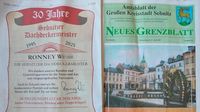A shocking advertisement in the Sebnitzer Amtsblatt has sparked outrage across Germany, as it openly displayed racist and anti-Semitic sentiments. The ad, published by local roofer Ronney W., wished readers a happy Easter and announced training positions for 2026, but it included a disturbing disclaimer: "ABER: keine Hakennasen, Bimbos oder Zeppelträger," which translates to "BUT: no hook-nosed people, bimbos, or Zeppelin carriers." This blatant exclusion of certain groups has led to a significant backlash from the community and local authorities.
The terms used in the advertisement have drawn widespread condemnation. The term "Hakennasen" is often associated with anti-Semitic stereotypes, while "Bimbos" refers derogatorily to people of darker skin tones. The meaning of "Zeppelträger" is less clear, but speculation suggests it could refer to individuals from alternative subcultures or possibly Muslims, given the context of discrimination.
On April 16, 2025, journalist Arndt Ginzel first brought the issue to light on social media, prompting immediate reactions from various sectors of society. The city administration of Sebnitz quickly distanced itself from the advertisement, stating on Facebook that it was "embarrassing and unacceptable" to read such content. They clarified that they are only responsible for the editorial part of the Amtsblatt and that the advertisement section is under the sole responsibility of the publisher, Linus Wittich Medien KG.
In a statement, the city expressed its dismay, emphasizing that "hate speech, anti-Semitism, and xenophobia have no place and will be rejected in every form." The administration has since filed criminal complaints against both Ronney W. and the publisher for the offensive content.
The publisher, Linus Wittich Medien, also issued a public apology, describing the advertisement as a "serious mistake" and stating, "We are deeply shocked by the publication of this discriminatory and inhumane newspaper advertisement. This wording contradicts our values and self-understanding. We distance ourselves from this content in the strongest possible terms." They have terminated their business relationship with the roofer and are currently reviewing their internal processes to prevent such incidents in the future.
As the news spread, local politicians from all parties condemned the ad. Sebnitz's Mayor, Ronald Kretzschmar, remarked that the advertisement was shameful and that there was nothing to discuss with the roofer, as it is now a matter for the public prosecutor and state security. He stated, "An adult man must be aware of the implications of his words," highlighting the seriousness of the situation.
In the wake of the controversy, the Tikvah Institute in Berlin has also filed a criminal complaint against Ronney W., further intensifying scrutiny on the advertisement's implications. Volker Beck, a former Bundestag member and head of the Tikvah Institute, confirmed that they have reached out to various regulatory bodies, including the Chamber of Crafts, to address the matter. He noted that the Dresden Chamber of Crafts has reiterated its commitment to diversity and has attempted to contact the roofer.
The incident has provoked strong reactions from religious leaders as well. Michael Baudisch, spokesperson for the Catholic Church in the Dresden-Meißen region, expressed shock at the blatant use of racist and anti-Semitic language, while Brigitte Lammert, the leading Protestant pastor in the Pirna district, questioned the direction in which society is heading when such statements can be made publicly.
Political leaders have united in their condemnation, stating, "We explicitly and decisively distance ourselves from the expressions used in the private advertisement and the inhuman ideas on which it is based. Our fundamental values of freedom, tolerance, and respect for human dignity are non-negotiable." The statement was signed by representatives from various parties, including the AfD, CDU, and the Green Party.
As the fallout from this incident continues, the city of Sebnitz has faced calls for greater accountability in its publication practices. Critics argue that the administration should not simply deflect responsibility onto the publisher, especially since the Amtsblatt carries an official city seal, which implies a level of oversight and quality control.
The outrage has also led to calls for demonstrations in Sebnitz, with local groups planning to protest against racism and anti-Semitism in the community. The Left party in Saxony has called for structural changes to ensure that such hateful content does not appear in public forums again.
In conclusion, the racist advertisement published in the Sebnitzer Amtsblatt serves as a stark reminder of the persistent issues of discrimination and intolerance that still exist in society. The responses from the city, the publisher, and various community leaders highlight a collective rejection of such ideologies, but the path forward will require significant effort to ensure that inclusivity and respect for all individuals are upheld in every aspect of public life.









